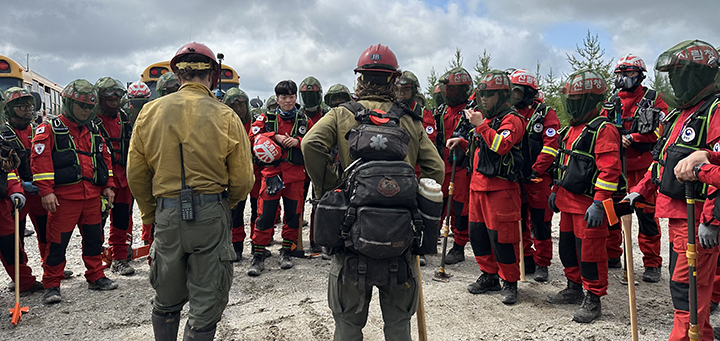Other News Releases
For Release: July 19, 2023
Contact: Stanton Florea 208-387-5437, stanton.florea@usda.gov
Boise, Idaho – More than 2,000 wildland firefighters and support personnel from the U.S. have been deployed to assist with fires in Canada through the National Interagency Coordination Center located at the National Interagency Fire Center (NIFC). The fire personnel are from the U.S. Department of Agriculture’s Forest Service; the U.S. Department of the Interior’s Bureau of Land Management, National Park Service, U.S. Fish and Wildlife Service, U.S. Bureau of Indian Affairs; along with state wildland fire agencies.
The mobilization, which began on May 8, currently includes 567 U.S. fire personnel assigned to wildfires in multiple provinces in Canada. Below-normal fire activity in the U.S. has allowed more firefighters to be available for assignments in Canada.
“We’re glad we can continue to support Canada while they continue to experience unprecedented activity,” said Jeff Arnberger, chair of the National Multi-Agency Coordinating Group (NMAC) at NIFC. “As long as they need us, we will continue to help Canada’s firefighters.”
Canada is experiencing a historic fire year with over 11 million hectares (about 27 million acres) burned so far this year. Requests for fire resources continue to come in from Canada as it remains at its highest wildfire activity level. Firefighters from numerous other countries have also come to Canada’s aid.
U.S. firefighting resources aiding Canada include fire crews, incident management teams, smokejumpers, and other fire management personnel.
The members of the NMAC Group would also like to recognize the recent tragic loss of two Canadian wildland firefighters.
“The U.S wildland firefighting community extends heartfelt condolences to the families, friends and crew members of the fallen,” said Jim Karels, NMAC representative from the National Association of State Foresters. “Their losses are felt by everyone, regardless of country. We want everyone to stay safe and return home.”
Along with federal resources, state resources are also providing support through state forest fire compact agreements that allow U.S. states and Canadian provinces to share fire resources as needed. Aircraft, fire crews and an incident management team have recently been provided by the state of Alaska. Three additional fire crews have also recently been provided through the Northeast Compact.
For the latest information, the NIFC International Support webpage at https://www.nifc.gov/fire-information/international-support is updated weekly (by Friday morning Mountain Time) with resource and personnel numbers.
Additional information is available on the NIFC Facebook page at https://www.facebook.com/NIFCFire and Twitter at https://twitter.com/NIFC_Fire.
As smoke from Canada’s wildfires continues to impact the U.S., air quality information is available on AirNow at https://www.airnow.gov/wildfires/.
For the most current information on the wildfires burning in Canada, please visit the CIFFC website at https://ciffc.net/.









